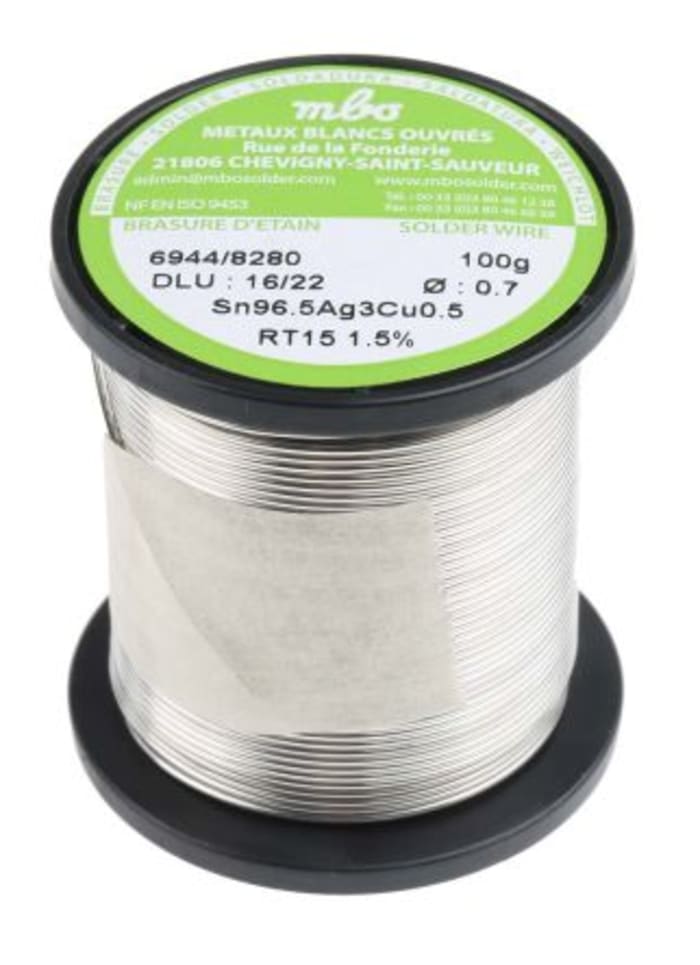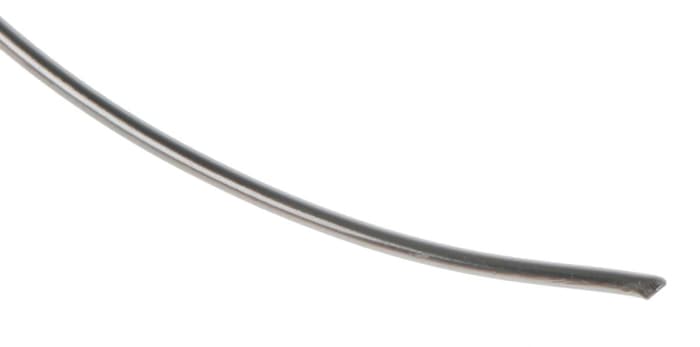RS PRO Wire, 0.71mm Lead Free Solder, 217°C Melting Point

Technical Document
Specifications
Brand
RS ProWire Diameter
0.71mm
Model Number
SAC305 NC600
Percent Lead
0%
Product Form
Wire
Melting Point
217°C
Percent Silver
3%
Percent Tin
96.5%
Flux Type
Rosin Based
Product Weight
500g
Flux Content Percent
2.2%
Percent Copper
0.5%
Distrelec Product Id
30407169
Country of Origin
United States
Product details
RS PRO Lead Free 3% Ag Solders
From the trusted RS PRO brand, this solder wire is a resin-based, SAC305 lead free solder wire that utilises a synthetically refined resin and effective activator package.
The flux formulation of this solder wire is ideal for wetting common Printed Circuit Boards (PCBs) and any components as it leaves behind a clear residue that can be easily removed with dry brushing for a cleaner look or safely left on the PCB after soldering.
The alloy used in this solder wire conforms to J-STD 006 and contains 96.5% tin, 3.0% silver and 0.5% copper.
Features and Benefits
• Versatile solder wire that is suitable for a wide range of soldering tasks
• Typical temperature of soldering iron tip for use with this solder is 360-400°C
• Melting point is 217-219°C
• Flux content 3.3%
Applications
Solder is used alongside soldering irons, particularly in securing electrical components to integrated circuit boards. The solder melts easily when heated, and cools quickly, meaning it can be moulded to secure components in place in solder joints. The quick setting nature of solder means it can also be used for light brazing.
Because of its relatively low melting point, solder can be reworked easily by heating it to melting point and using a solder sucker to remove it.
Solder is commonly used with SMD and through-hole components, with applications in repair, prototyping and production.
What are the differences between lead-free solder and leaded solder?
Lead-free solder is generally regarded as having a more positive environmental impact than leaded solder, and also as being safer for human use. However, lead-free solder also has potential production advantages. Lead-free solder can offer better lead spacing, which makes it more suitable for high-density components where pitches are tight. This means potentially better performance where space saving is a concern.
The advantages of lead solder are that it has a lower melting point, which is sometimes preferable for hand working components. Also, lower working temperatures reduces the risk of damage to components and circuit board.
Unlike lead-free solder, lead solder does not have a shelf-life and is less prone to losing quality after prolonged exposure to oxygen. However, many electronic application requirements exclude the use of lead solder, due to the toxicity of lead.
Why RS PRO?
RS PRO aims to be your go-to brand for reliability and value for money. We source great parts at great prices and test everything with our in-house experts to ensure the quality you need.
When it comes to tools, we know that versatility and dependability are what you need. As such, we stock a variety of mainstay and specialist tools to suit any application. Whether you're a professional electrician, technician, engineer or home inventor, RS PRO is here to support you.
Standards
RoHS compliant; Flux classification per J-STD 004 is ROL0 which leaves a highly reliable post soldering residue.
€ 105.45
€ 105.45 Each (Exc. Vat)
€ 127.59
€ 127.59 Each (inc. VAT)
1

€ 105.45
€ 105.45 Each (Exc. Vat)
€ 127.59
€ 127.59 Each (inc. VAT)
1

Stock information temporarily unavailable.
Please check again later.
| Quantity | Unit price |
|---|---|
| 1 - 9 | € 105.45 |
| 10 - 19 | € 102.60 |
| 20 - 49 | € 100.70 |
| 50+ | € 98.80 |
Technical Document
Specifications
Brand
RS ProWire Diameter
0.71mm
Model Number
SAC305 NC600
Percent Lead
0%
Product Form
Wire
Melting Point
217°C
Percent Silver
3%
Percent Tin
96.5%
Flux Type
Rosin Based
Product Weight
500g
Flux Content Percent
2.2%
Percent Copper
0.5%
Distrelec Product Id
30407169
Country of Origin
United States
Product details
RS PRO Lead Free 3% Ag Solders
From the trusted RS PRO brand, this solder wire is a resin-based, SAC305 lead free solder wire that utilises a synthetically refined resin and effective activator package.
The flux formulation of this solder wire is ideal for wetting common Printed Circuit Boards (PCBs) and any components as it leaves behind a clear residue that can be easily removed with dry brushing for a cleaner look or safely left on the PCB after soldering.
The alloy used in this solder wire conforms to J-STD 006 and contains 96.5% tin, 3.0% silver and 0.5% copper.
Features and Benefits
• Versatile solder wire that is suitable for a wide range of soldering tasks
• Typical temperature of soldering iron tip for use with this solder is 360-400°C
• Melting point is 217-219°C
• Flux content 3.3%
Applications
Solder is used alongside soldering irons, particularly in securing electrical components to integrated circuit boards. The solder melts easily when heated, and cools quickly, meaning it can be moulded to secure components in place in solder joints. The quick setting nature of solder means it can also be used for light brazing.
Because of its relatively low melting point, solder can be reworked easily by heating it to melting point and using a solder sucker to remove it.
Solder is commonly used with SMD and through-hole components, with applications in repair, prototyping and production.
What are the differences between lead-free solder and leaded solder?
Lead-free solder is generally regarded as having a more positive environmental impact than leaded solder, and also as being safer for human use. However, lead-free solder also has potential production advantages. Lead-free solder can offer better lead spacing, which makes it more suitable for high-density components where pitches are tight. This means potentially better performance where space saving is a concern.
The advantages of lead solder are that it has a lower melting point, which is sometimes preferable for hand working components. Also, lower working temperatures reduces the risk of damage to components and circuit board.
Unlike lead-free solder, lead solder does not have a shelf-life and is less prone to losing quality after prolonged exposure to oxygen. However, many electronic application requirements exclude the use of lead solder, due to the toxicity of lead.
Why RS PRO?
RS PRO aims to be your go-to brand for reliability and value for money. We source great parts at great prices and test everything with our in-house experts to ensure the quality you need.
When it comes to tools, we know that versatility and dependability are what you need. As such, we stock a variety of mainstay and specialist tools to suit any application. Whether you're a professional electrician, technician, engineer or home inventor, RS PRO is here to support you.
Standards
RoHS compliant; Flux classification per J-STD 004 is ROL0 which leaves a highly reliable post soldering residue.


